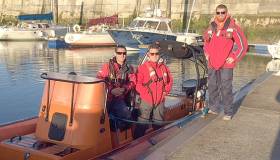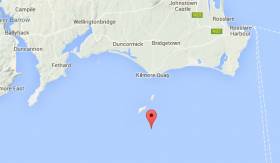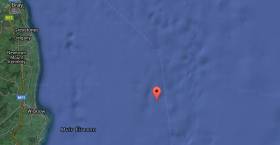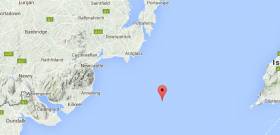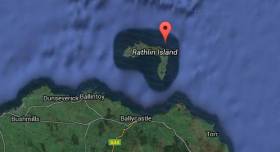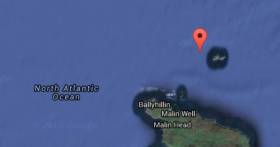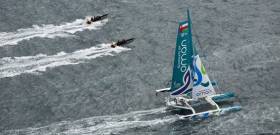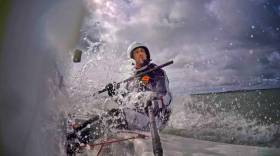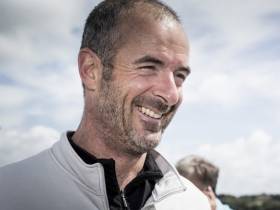Displaying items by tag: Round Ireland
Three Tralee Bay Sailing Club members set out from Fenit in county Kerry yesterday to retrace a TBSC voyage first made 25 years ago. Ribbers Cian O'Donnell, James Landers and Giles Kelliher set out from the most westerly port in Europe on the 700–mile circumnavigation. Pit stops are planned in Burtonport tonight, then Bangor, Kilmore Quay, Dingle before returning home to Fenit.
An entry into next month's Volvo Round Ireland Race finished second in this weekend's Myth of Malham race and now tops the RORC points series just three weeks before the Irish offshore classic begins in Wicklow. Royal Irish sailor Michael Boyd will skipper the First 44.7, Lisa for the 700–mile Irish race and given this weekend's performance, the Beneteau yacht is very much up to speed.
Tenacity and dogged determination were to the fore for the class winners of the 230-mile Myth of Malham Race. With a light fickle northerly breeze, staying alert and making the best of the light conditions was the recipe for success. Yachts from Britain, France, Germany and Oman were the class winners.
Gilles Fournier's French J/133, Pintia was the overall winner of the Myth of Malham Race, after a tremendous battle with Suzi and Nick Jones' British First 44.7, Lisa. The two boats were literally side by side for the 230 mile race and after IRC time correction Pintia was the winner by just eight seconds after 38 hours of racing. Lisa was second but now leads the RORC Season's Points Championship. Past RORC Commodore Mike Greville racing his Ker 39, Erivale III was third overall.
Gilles Fournier was sailing back to their home port of Le Havre when he heard the news. “The whole crew are delighted but I must ring Nick Jones.” smiled Gilles. “When you are on the right side by eight seconds it is nice but I suppose Nick will be on the right side next time. They managed to stay ahead of us for sometime but we caught up and rounded Eddystone in front but then we ran out of wind and they passed us again. However, w never gave up, we kept up our motivation to the end because we knew that it would be very close. Like Nick and Suzi's Lisa, we are a family boat. Pintia sails with my daughter Corinne Migraine and my grandson Victor Migraine and my two nephews; Yan and Thomas Fournier. Also Daniel Devos who is one of the best Laser Masters in the world. We are all from the Société des Régates du Havre and it is the best sailing school in France.”
“We really pushed each other and that is probably why we both did so well.” commented Lisa's skipper, Nick Jones. “Keeping going in light airs for that length of time is far more difficult that racing in moderate or heavy weather and all the crew had to dig deep to stay alert. With just zephyrs of wind concentration levels need to be maintained. Suzi did a fantastic job trimming the Code Zero. Using the apparent wind to hop from one puff of breeze to the next was the trick and the team managed that very well. We are delighted to be leading the RORC Season's Points Championship and would like to thank the Pintia team for a fantastic race. Now home to look after our three children!”
The battle of the MOD70s in the Multihull Class was won by Musandam-Oman Sail, skippered by Sidney Gavignet. Tony Lawson's Concise 10, skippered by Ned Collier Wakefield, was just under 12 minutes behind after a cat and mouse chase lasting 21 hours. The Multihulls started after the rest of the fleet and although Musandam-Oman Sail were first over the line, Concise 10 did a better job of getting through the traffic to make the favoured main land shore in the crowded Solent. However, it was the Omani MOD70 that led out past The Needles into the English Channel, passing Concise 10 just after Lymington in a better wind line. Concise 10 came back, taking the lead on a hitch offshore after Swanage, but once again Sidney Gavignet's team came back, in fresher breeze building from behind, to round Eddystone Lighthouse ahead of their rival. Concise 10 narrowed the margin by staying offshore at Portland on the return leg, but Musandam-Oman Sail covered their competition from the front, to take line honours and the multihull class.
Musandam-Oman Sail's skipper Sidney Gavignet commented: "Light, very light! But great racing. We just managed to move away from Concise, a bit more than a mile, but that is nothing. From the start we have had a good battle, probably doing better gybes than our friends, which helped us to get out of the Solent. But then a transition zone came and messed with the cards and we got over taken…. Raghhhh! The team is sailing well, with no mistakes on the manoeuvres. It is good to be racing. Before the race, RORC Commodore, Michael Boyd, prepared a nice speech and gave it to Fahad Alhasni, to read in Arabic…Probably the first time that Arabic has been used in the RORC, it was great!"
Piet Vroon's Dutch Ker 51, Tonnerre 4 was the first boat home racing under IRC but a building breeze favoured their German rivals, Avenarius & Gondesen's Ker 46, Shakti was the winner of IRC Class Zero, after time correction. It was Shakti's second class win of the season and puts the team narrowly ahead of Tonnerre 4 for the class.
In IRC Two, Gilles Fournier's French J/133, Pintia scored a commanding victory, winning the class by nearly five hours after time correction. Two British J/122s enjoyed a terrific battle for second place. After racing for for two days and night, Andy Theobald's R&W crossed the finish line just two minutes ahead of David Richards' Jolly Jellyfish sailed by Gianluca Folloni. However, after time correction Jolly Jellyfish won the battle for second place. The Army Sailing Association's J/122, British Soldier finished a tenacious fifth to take the class lead for the season in IRC Two.
In IRC Three, Benoit D'halluin's A35, Dunkerque - Les Dunes de Flandre took both line honours and the win on IRC corrected time for the class. Second was Louis-Marie Dussere French JPK 10.10 Raging Bee with Nick Martin's British J/105 Diablo-J in third.
In IRC Four, Noel Racine's JPK 10.10, Foggy Dew took line honours for the class but the winner on IRC corrected time was Stuart Greenfield's Half Tonner Silver Shamrock. Hugo Tardivel's A31 Columbus Circle was third. Silver Shamrock was also the winner of the IRC Two-Handed Class. Louis-Marie Dussere French JPK 10.10 Raging Bee was second in IRC Two-Handed Class less than 13 minutes ahead of Nick Martin's British J/105 Diablo-J. Robert Nelson's J/105 Bigfoot was fourth, retaining the IRC Two-Handed class lead for the season.
Four Class40s entered the Myth of Malham Race. Christophe Coatnoan's Partouche took up the early running but Adriaan van Oord's Moonpalace was the eventual winner with Partouche second. Tony Lawson's Concise 2, with an all girls team sailed by Joy Fitzgerald was third and lead the RORC Season's Points Championship.
The RORC Season's Points Championship continues with the 125-mile Morgan Cup Race on Friday 10 June from Cowes to Dieppe and the Round Ireland Race a week later. For full results from the Myth of Malham Race: www.rorc.org
Hibernia Round Ireland Powerboat Record Update: 17.00
Hibernia Round Ireland Powerboat Record Update: 15:34
Hibernia Round Ireland Powerboat Record Update: 14:30
Hibernia Round Ireland Powerboat Record Update: 12:56
The learning curve on the Sultanate of Oman’s flagship MOD70 Musandam-Oman Sail is due for a shift in emphasis in 2016 with their early season programme of the Myth of Malham, the Round Ireland Yacht Race and the Transat Quebec-St Malo races designed to hand Omani crew extra roles and responsibility in the pursuit of success.
Last year, French skipper Sidney Gavignet placed the focus on fitness as they racked up thousands of miles across Europe with a 50% Omani crew, setting a new Round Ireland record plus a new speed record at Kieler Woche 2015.
The stakes have been raised this year and the selection of the three events in May, June and July will help to prepare the Omani sailors for roles at the highest level of offshore racing.
The Myth of Malham at the end of May (28-29) and the Round Ireland Race in June (18) are both organised by the UK’s Royal Ocean Racing Club and offer an opportunity to compete against other MOD70s, explained Gavignet, while the Quebec to St Malo Race is more about adventure and exploration.
“The Quebec to St Malo Race is a classic,” he said. “It is a race I have done three times and it is special. East to west across the Atlantic starting with a 400-mile section down the Saint Lawrence river which is bordered by mountains on both sides. There are lots of whales – including the Beluga Whale – and white beaked and white sided dolphins. In a sailor’s career doing this race is something you will never forget.
“It is more about adventure and the memories. Also it means two transatlantics – one going there and one coming back so it is good training for our Omani crew mates.”
Although Oman Sail and Gavignet have yet to finalise the crew for the season, he is keen to take new offshore talent Raad Al Hadi, who impressed during a recent training run between Lorient and Morocco.
“Raad is good and learning quickly so we will take him from Quebec to St Malo where he will gain experience but he is still a student so we do not plan to take him on the RORC races,” Gavignet said.
Omani sailors Fahad Al Hasni, Sami Al Shukaili, Yassir Al Rahbi will also be back in action along with Irish offshore specialist Damian Foxall and France’s Jean Luc Nelias, who was navigator on Volvo winner Groupama in 2006.
The three Omani sailors have been preparing for their summer by campaigning their J80 at the 2016 Grand Prix Ecole Navale in France having raced together for EFG Sailing Arabia – The Tour in February.
Gavignet’s experience will serve Musandam-Oman Sail well in the Quebec-St Malo but the Myth of Malham, a 230-mile race from Cowes to the famous Eddystone Lighthouse and back, will be a brand new experience for him.
“It is an English classic so we are looking forward to it and would love to win it. We will be up against two other MOD70s which is the main reason why we are doing it but it will be a challenge because the other two boats Phaedo and Team Concise have done a lot of sailing over the last few months.”
Results are important, Gavignet continued but Oman Sail’s objective to develop top class sailors for world class events requires a broader focus.
“We want the guys to take on more responsibility. To be an accomplished offshore sailor, you have to think on your feet and we have some real talent on this crew so I will be working with each crewmember individually to encourage them to take responsibility, perhaps for a winch or for safety or whatever other role they might need to prepare for a major offshore race.”
The remainder of Musandam-Oman Sail’s summer programme will be announced later in the season but according to long standing crew member Fahad Al Hasni, racing against the other MOD70s is the highlight.
“By the end of this programme, we would like to be the leading MOD70,” he said. “It will be a challenge because the boats are all different now and the other crews have done a lot of sailing but our time together as a team on the Farr 30 at EFG Sailing Arabia – The Tour, during our training run from Lorient to Rabat and in the J80 at GP Ecole Navale has made a difference to our team work so we feel well prepared.”
MOD70 Musandam-Oman Sail Programme
Myth of Malham: Starts Cowes, Isle of Wight – Saturday 28 May
Volvo Round Ireland Yacht Race: Starts Wicklow, Ireland – Saturday 18 June
Quebec – St Malo: Starts Quebec, Canada – Saturday 10 July
#OneWildRide - Schull sailor Gary Sargent aims to be the first to round Ireland in a Laser dinghy when he embarks on his charity voyage within the next fortnight.
As previously noted on Afloat.ie, the Howth Yacht Club member and Frostbite competitor is "undertaking the mammoth task of sailing a Laser around Ireland" this summer.
And as The Irish Times reports, 'Ted' hopes to raise funds during his eight-week, 1,500km solo circumnavigation for ChildVision, a charity supporting children with visual impairments and related disabilities.
While he's sailing alone on his Laser on his One Wild Ride, he will have the support of a RIB and volunteers on shore following him along the route with necessary supplies.
Even so, Sargent's been battling the elements – and the unseasonable cold – on his long-distance training runs, proving that he's no pretender for this challenging task.
The Irish Times has more in the story HERE.
French skipper Sidney Gavignet’s crew of Omani sailors are no strangers to the 700 mile Round Ireland race track having famously smashed the record in 2015 after completing the course in 40 hours, 51 minutes and 57 seconds, some four hours faster than anything achieved previously. As a result, there will be an extra incentive for Kerry sailor Damian Foxall who despite previous bids was not onboard for the record breaking run last year. Foxall rejoins the crew for the Round Ireland in six weeks time and is very much looking to the multihulls debut in this year's offshore classic.
Fahad Al Hasni, Yasser Al Rahbi and Sami Al Shukaili were all on board for the record-breaking voyage and all return to action for the Round Ireland Race.
The team has developed a strong bond, says Gavignet so the prospect of lining up against other professional MOD70 crews in June for the start in Wicklow, to follow a course that leaves Ireland and all its islands excluding Rockall to starboard, serves to stir their competitive spirits.
“This Omani crew has a long history – last season especially was very demanding – so we have a very good team with a great team spirit,” said skipper Gavignet.
“We would like to win the race but know it will not be easy because the other MOD70s have been sailing a lot in the past few months. We have trained hard and the guys are performing at a different level now so we are very happy to go and do our best against the others.
“We hold the record but it is possible to do better and it is likely that whoever wins will set a new record, depending on the conditions. It is very exciting to be racing against Phaedo and Concise – it will be a good contest.”
Preparations for the race have included some intensive training offshore as well as participation in the Grand Prix Guyader in Douarnenez, France, last weekend where the Omani Diam 24 team onboard Oman Airports by Oman Sail finished in 3rd place.
This weekend MOD70 sailors Fahad, Sami and Yasser are due to compete on Oman Sail’s J80 at the Grand Prix Ecole Navale at the French Naval Academy in Lanvéoc to get some crucial fleet race practice.
Success in sailing against the clock for a speed record requires a different mindset to racing in a fleet, said Fahad, Oman’s most experienced and successful offshore sailor.
“Competing with other boats in the Round Ireland race will be different to breaking the record and probably a lot more difficult,” he said.
“The other MOD70s have been training and racing all year and have achieved some good results so they will be hard to beat. But we will be sailing the boat as fast as we can and if we can win, it will be fantastic for us because this is a two thirds Omani crew.”
Records are one thing but when you get two boats racing side by side, the results speak for themselves, commented Damian Foxall, acknowledged as Ireland’s most accomplished ocean sailor.
“This season, our campaigns are all about fleet racing. When you are racing against the clock, you never know if you are performing 100% but in fleet racing, if you are not going 100%, you probably aren’t winning. And you know pretty quickly whether you have taken a good or bad option.
“Fleet racing is more like a game of chess and what the other boats do on the course can affect your own tactics. So you have to be on your game 100% all the time and sail a lot harder. Our guys understand that completely.”
A couple of years ago, Musandam-Oman Sail would have been favourite to win the multihull class, Foxall continued but an upsurge in activity on the other MOD70s means they have a contest on their hands.
“The guys on Phaedo and Concise are sailing extremely well now so a couple of years ago, we might have been favourites but that is certainly no longer the case and we are going to have to compete really hard to get a result this year. But we know how to sail the boat so this is great and exactly how it should be.”



























